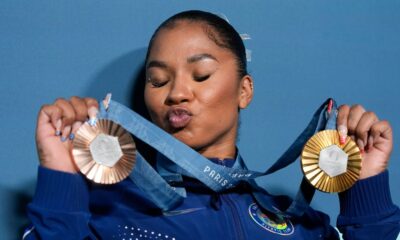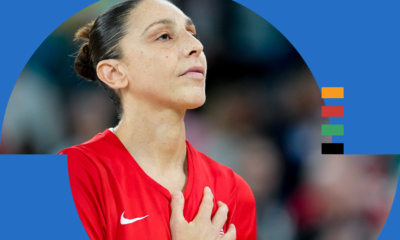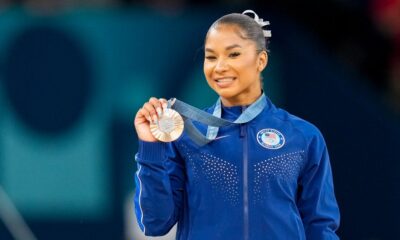Sports
If that’s it for Simone Biles’ Olympic career, let’s all appreciate what we just saw

PARIS – Manila Esposito, the bronze medalist on the balance beam, stared like a deer in the headlights during a packed post-race news conference. As she began to speak, her voice barely audible, Simone Biles leaned forward, adjusted Esposito’s microphone and nodded to the Italian gymnast that she was ready to go. Later, after the moderator asked a question to Esposito’s teammate Alice D’Amato, it took a while for D’Amato to respond. The moderator began to warn her, when Biles gently reminded the moderator that the translation to the earphones will take some time.
Every now and then a reminder comes along: Simone Biles is 27 years old. This isn’t her first rodeo. She knows a thing or two about microphones and translations, about succeeding and even a little about failure. Biles began competing internationally more than a decade ago, as a 16-year-old with braces. She wasn’t old enough to drive. She wasn’t old enough to drink when she went to Rio in 2016.
Now she’s married, but like a new bride who, as she leaves the ceremony, is asked when she wants to start a family, Biles has been asked, even before finishing the competition in Paris, how she feels about Los Angeles. She initially responded with a non-answer. It would be wonderful to compete on her home turf, she admitted, but she also acknowledged that age is not just a number. “I’m old,” she said, laughing.
She later expressed her annoyance with have worked for all our lives.”
It’s actually the core of it, but in Biles’ case it’s the message that needs to be turned around. It’s everyone else who needs to appreciate it, instead of eagerly wondering if we could enjoy it even more. This is of course what happens. We become spoiled and then desperate, desperate not to let go of something we probably took for granted. Biles is a constant, an almost certain thing in the sport. Neither age, nor injury, abuse or mental health demons have defeated her. She comes back every time, and so we have to worry: what if this is it?
That could very well be the case. Her coach, Cecile Landi, is leaving to become head coach at the University of Georgia. Her husband and Biles’ co-coach, Laurent, will follow in a year after their daughter graduates. It seems like the ideal transition. She has nothing left to prove, but that’s the tease. Three years ago it was no longer about proving something.
Then, done by the twisties in Tokyo, Biles did the painful digging of unearthing the root of her mental health issues. She admitted to abuse at the hands of Larry Nassar and courageously questioned USA Gymnastics’ role in it before the Senate Judiciary Committee. She questioned her own ‘why’, a frightening proposition for all of us, where we are really confronted with what we want and what it is all about. Then she had the courage to admit that she had lost her direction, that she had traded her love of gymnastics for answering a bell. Even braver, Biles set out to fix it, taking a year off from a sport where time is already brutal.
“To do the work, the personal work to be here and perform, it’s amazing,” Laurent Landi said. “It just shows how strong the mind is, and that if you heal it the right way, you can be very, very successful.”
She barely fades. Biles spent all week here with a nagging calf injury, which was originally injured before the trials and adjusted here during the qualifiers. Doctors wrapped her leg throughout the game, and while Biles downplayed its severity (“You’re all curious,” she jokingly chastised reporters when asked about it) Landi admitted it was a matter of managing the pain, and not eliminating it. Medication, treatment, ice, the usual setup, all to make it ‘stop’, very different from cure. “Of course it bothered her,” he said. “Did it affect her performances? I do not think so.”
Landi then grinned, as if to say, “Just tell me.” Four medals, three of which are gold, more than all but 22 countries that have participated in Paris so far.
The final day was of course intended as a coronation, a victory lap and an au revoir. Instead, it revealed Biles’ humanity. She was tired. She participated four out of the five possible days. And she was mentally exhausted. The quest to right the ship from Tokyo weighed heavily on her. The event finale also felt weird. Instead of playing music while the gymnasts performed, the Bercy Arena turned into a church, complete with so-called church ladies who dared people to tsk-tsk in response when the gymnasts mastered a skill on the beam.
“We asked several times if we could have some music or background noise,” Biles said. “So I don’t know exactly what happened there.”
These are not excuses; they are realities. The beam turned into the Hunger Games, medals awarded to those who didn’t fall off. Three women, including Sunisa Lee, fell before Biles and two others suffered serious balance checks. But when Biles missed a landing on her back and stepped out and fell, the arena gasped. Later, after the competition ended and Biles had not officially medaled, a mother in line at the Bercy Arena concessions lamented to her young daughter, “I feel so bad for Simone.” Her wide-eyed daughter responded, “She fell,” as if she had just witnessed DaVinci paint outside the lines or Beethoven miss a chord.
Whatever Simone Biles decides to do, her legacy will be one of gymnastics excellence and, most importantly, leadership and courage off the mat. (Naomi Baker/Getty Images)
In her defense, the girl couldn’t have been older than 8, and in her lifetime, Biles was Olympian perfection. Until this beam final, Biles had competed in nine different Olympic events in her career, including team, all-around and event finals. She had medaled in all of them and earned gold in seven.
Then her humanity had the audacity to strike again. Two hours after her beam went weak, Biles returned for the floor exercise, an event she never lost, either at the Olympics or the world championships. She landed awkwardly during the warm-up and appeared to be healing that same calf injury. Biles tended to be short, but still went out and landed her first tumbling pass, restoring order to the universe. But on the second and fourth, Biles stepped out of bounds twice, costing her precious tenths of a point, just enough to earn her second place behind Brazil’s Rebeca Andrade.
It should be noted: she botched two moves named after her that no one else even attempts. This is Biles’ definition of failure.
Her definition of success? If you ask Biles, it’s not in the medals, her power. It is in what showed itself on the last day of the competition: her authenticity. She’s proud of what she’s accomplished, but she’s even prouder of who she’s become and the people she believes, accurately put, she’s helped.
“Putting your mental health first and taking time for yourself, whether you exercise or not, it’s about longevity,” she said. “Specifically a long life in sports, but also just for a better, healthier lifestyle.”
Not far from where Biles was competing, a woman walked along a Parisian sidewalk, following her friendly Australian Shetland Sheepdog. She indulged dog lovers in need of a fix and stopped to chat. She is French but was in Paris to enjoy the Olympics and when she heard her new canine friends were from the US she immediately said how much she enjoyed the ‘American gymnast’. She had seen Biles’ documentary on Netflix and praised her for opening the dialogue about mental health.
“I’m not an athlete,” she said, adding that she was nevertheless grateful that Biles felt it was okay to “talk about your personal problems.” “I appreciate that.”
If this is the end, we should all appreciate Simone Biles.
(Top photo of Simone Biles with her gold medal from the vault competition: Tom Weller/VOIGT/GettyImages)













